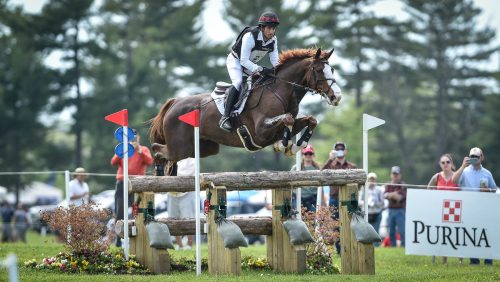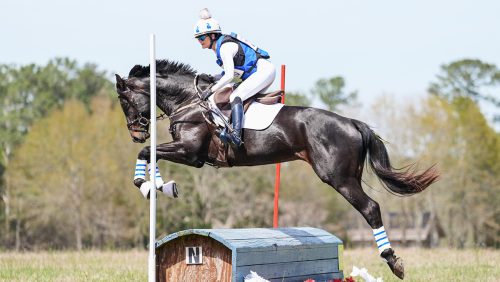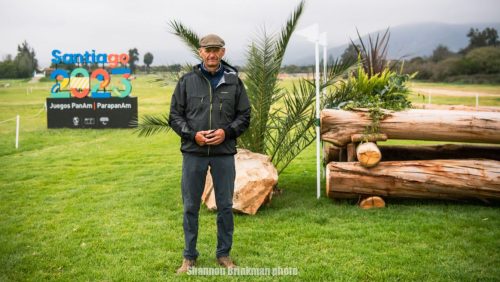The way I was grinning, laughing and hugging my horse after finishing a beginner novice event at the Kentucky Horse Park in sixth place, you would think we had just won the darn Olympics.
The fences were little, the dressage test was simple to the extreme—there was no reason for me to be this excited about finishing a little event with a green ribbon, and anyone watching my over-the-top gleeful demonstration would be well within their bounds to throw an eye roll my direction—I would roll my eyes at me!
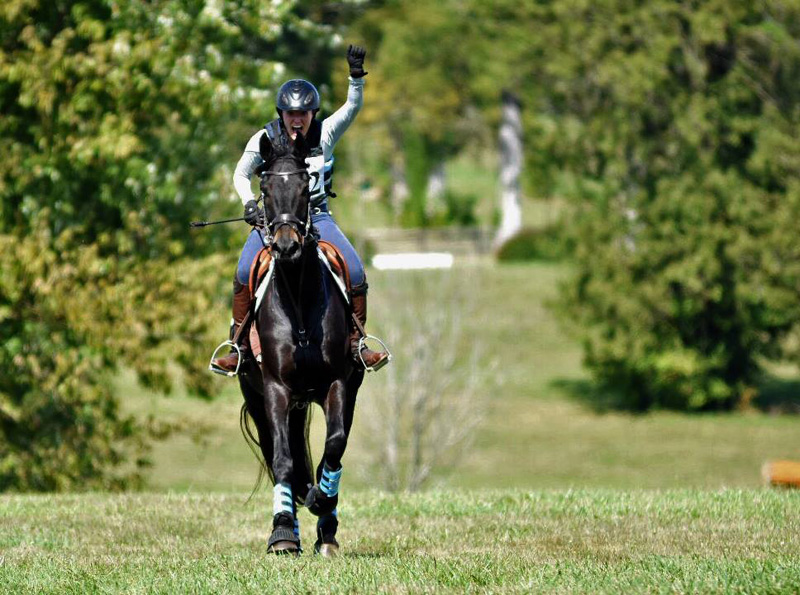
Is a jubilant fist-pump overkill at beginner novice? I think not. Photo by Andrea Evans
I surprised myself at how elated I was with my horse and the event, and it didn’t quite fall into place why I felt so on top of the world until I was pulling out of the Kentucky Horse Park looking in the rearview mirror of my truck at my horse in the trailer.
I grew up showing hunters, and showing at the Kentucky Horse Park was a huge deal for us. I’m from Iowa, and it was our big show of the year and the most expensive we went to due to the 12-plus-hour haul. My parents were supportive of my horse-craziness and wanted me to be able to show, but they also wanted me to appreciate how expensive this hobby was. “Someday you’ll be paying for it all yourself,” they’d tell me, and they started easing me out of the nest toward the end of high school by having me take on some of the show expenses.
I worked at a pizza place and cleaned stalls for half a year to raise $1,000 to pay for both ways of shipping to Kentucky, and as I remember as I handed over my check to the shipper I couldn’t believe how much work had gone in to just paying for one part of attending this show. Granted, I was working part-time minimum wage jobs, but all I could think was if that just paid for shipping, how the hell was I going to pay to board, ride and compete all on my own? On a 20-something’s starting salary?
Young teen Ann was an incredibly high-strung and anxious little person; I cried at the drop of a hat and worried constantly about a myriad of things. One of the biggest worries being what would I do if I couldn’t ride and show, be it for the inability to pay for it or time constraints of college and working after I graduated. I couldn’t imagine waking up without that outlet waiting for me at the barn; like many people I find riding so therapeutic, it was stressful thinking I would not be able to afford it myself.
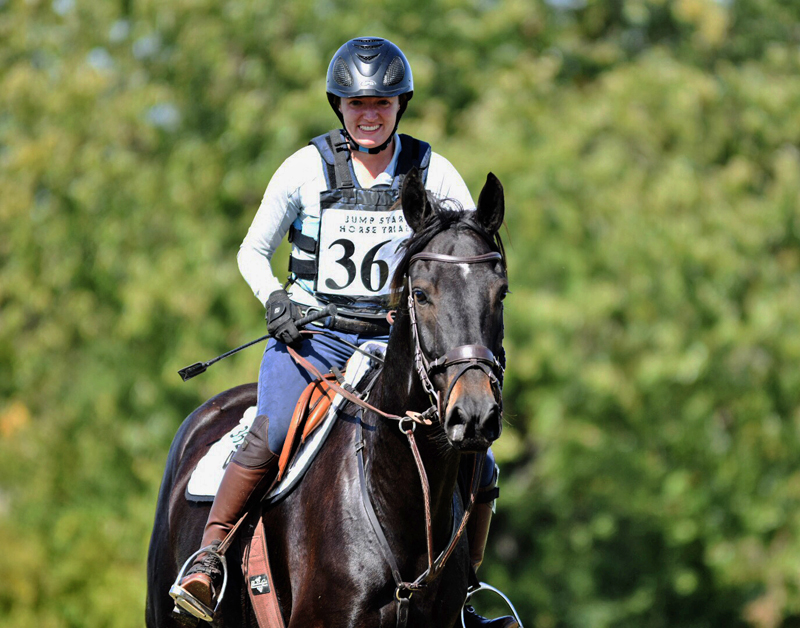
Seriously, what else can make someone smile like this? Photo by Andrea Evans
As I was pulling out of the horse park after our best event to date, I really wish I could go back in time and pat my little worried high school self on the head and say, “There, there, little ball of nerves, not to worry—here is how your parent’s pocketbookless horse life is going to work…”
• You’re going to figure out how to stretch your little pile of acorns to cover all the horse related things your parents used to pay for—some people call it a budget, but that seems too formal a term for the chicken scratch on a torn sheet of notebook paper you magnet to your fridge.
ADVERTISEMENT
• Your parents paid for full care board and weekly lessons at a farm with an indoor arena? Well they had a much bigger acorn pile—you’re going to find a self-care facility up the road from your apartment with no ring at all. You’ll ride in a field and take lessons when you can, and you’ll read books and Google exercises and get ideas from friends for when you can’t.
• Your parents bought you a quiet little hunter to learn to ride on? You’re going to find a 2-year-old Friesian-Thoroughbred cross online, and he’s going to throw you into the round pen panels the first time you get on him as a 3-year-old. You’ll be fine, you’ll immediately go purchase a crash vest, and you’ll store this little lesson away as why people use a mounting block to get on young horses, not a leg up!
• Your parents paid to have your horse hauled to most shows? You’re going to find a ‘90s era two-horse bumper pull trailer on Facebook. You’ll haul it around with a rented UHaul (#noshame, shame is for people with more acorns) until you save up $2,500 to buy your friend’s old truck. It will have giant holes in both front seats, no heat or air conditioning and the paint baked off, but it hauls your tin can trailer safely, and that’s what counts.
• You want to compete? You’ll scrape together some entry money, you’ll haul yourself there and compete. No trainer, no grooms, maybe a nice friend with a camera and/or running shoes to sprint and grab your forgotten armband.
• Sometimes things will go great—you’ll hook up the trailer on the second or third try, the horse will hop right on, you’ll show up on time for your class and put in your best rides.
• Sometimes the wheels will fall off the bus—the trailer jack will hit a speed bump at the horse park and come unhitched, the horse will refuse to load for two hours, you’ll show up so late for your dressage test the in-gate lady does a double-take at your number and sends you straight in for your test without warm-up, and you’ll give yourself a pat on the back for waiting to cry until you were driving home in your UHaul. It will not all be rainbows and butterflies. It will be a lot of bruised egos and beers.
But someday on a crisp morning in September, you’ll pull into the Kentucky Horse Park—that venue that made your little 16-year-old eyes bug out of your head with excitement at the thought of showing there, and the baby horse in your trailer will just feel like a million bucks. He’ll be fired up and leaping around the warm-up ring like he has springs for hooves, and he’ll put all that energy into his best dressage test to date and a double-clear stadium round.
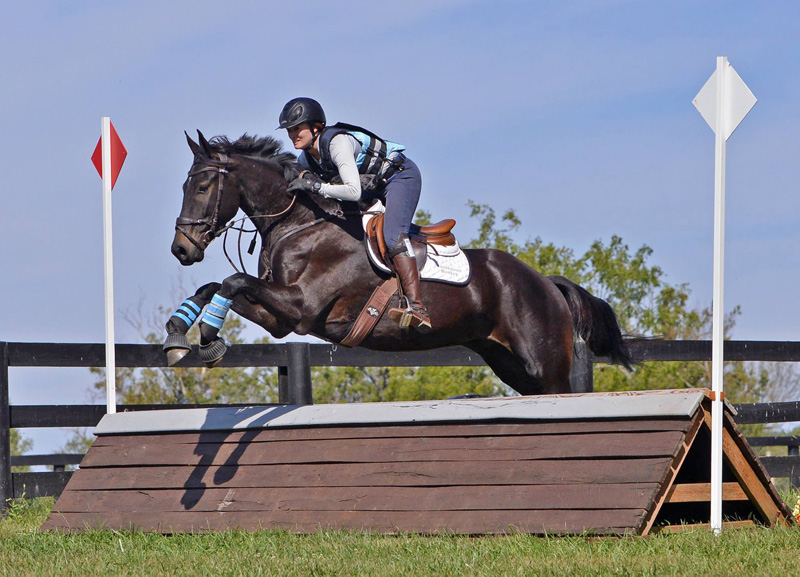
Moji doing his thing. Photo by Xpress Photo
You’ll run around cross-country having more fun than your show hunter brain can comprehend at this point, and you’ll come across that finish line feeling like you just won the darn Olympics.
ADVERTISEMENT
Not because the jumps were large or the test impressive, not because you won—because you’re doing it. You’re doing it! This crazy hobby you fell so madly in love with as a kid and never thought you’d be able to afford on your own beyond taking a leisurely trail ride on a borrowed horse. You’re competing at a USEA horse trial, you’re not making a fool of yourself, and you have just enough acorns left in the bank to get you to your next pay check. You’re doing it—and you’ll be far prouder of that silly green ribbon you earned than any blue one you won in the hunter ring.
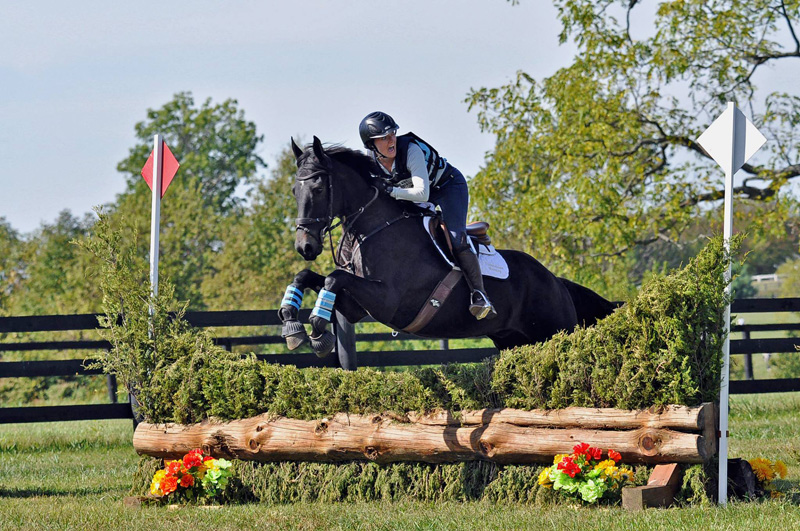
Just because we’re not in the hunter ring doesn’t mean Moji can’t have super-cute knees, right?! Photo by Xpress Photo
Nothing against riders who have someone to fund their riding ventures, be it parents or whoever—it’s a sweet gig if you can get it! There is just something to be said for getting there without it—it’s what makes us at the Chronicle excited to write about someone who wouldn’t be in the sport if they weren’t scraping, pinching and giving their all just to be able to show up at the ring.
I feel like we need a secret handshake or salute for when we see each other, the fellow competitor in the noisy old truck and tin-can trailer, the one who’s also about to unload a baby horse hurricane that will be turning heads in the warm-up for all the wrong reasons—I raise my electric taped-together crop to you, my fellow scrappy amateur. May your truck continue running to the next show, your beer stay cold, and your horse stop just short of throwing you in the dirt.
Some days it really feels like this sport is against us, like it is pricing itself out of our reach at every turn, and life would be so much easier if we just called it a day and saved our hard-earned little acorns for things like houses and savings accounts. I’ll try to remember my green ribbon Olympic moment on those days, because that’s a feeling worth whatever beg, borrow and steal it takes to make happen.
Ann Glavan is an editorial staffer for The Chronicle of the Horse. Originally from Cedar Rapids, Iowa, Ann grew up competing at A circuit shows in the hunter and equitation divisions, first on her pony Is A Belle and more recently on her horse Happy Go Lucky. After two internships at the Chronicle, Ann joined the editorial staff in the fall of 2015. Read all of Ann’s blogs…
Last year, Ann purchased a 3-year-old Friesian-Thoroughbred cross to work with and eventually compete. Moji, now 4, has been under saddle for a little over a year, and he’s been to his very first local horse show, a Sinead Halpin clinic, and an event.
Save







